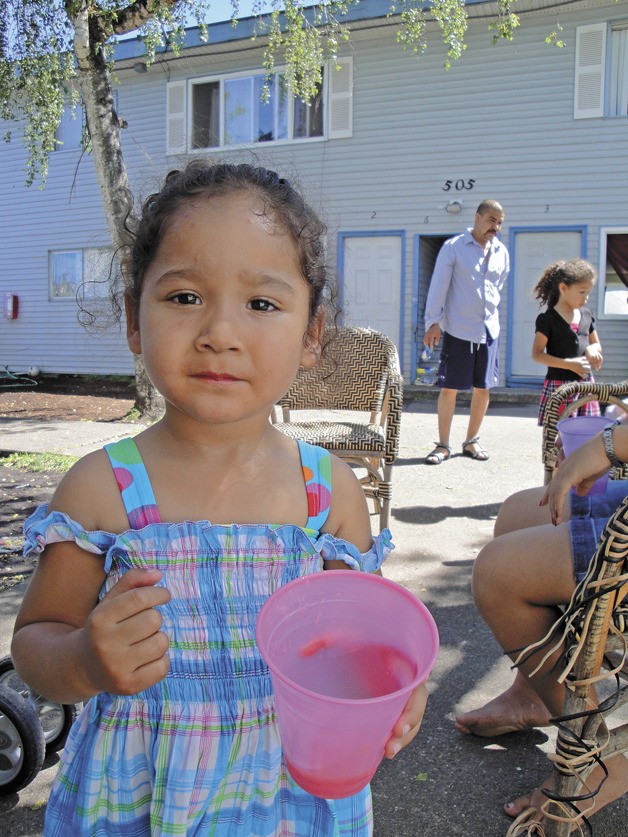Sweat dots Jorge Rosas’ forehead, thickening in a pool above his deeply lined, furrowed brow. It’s a hot day, much hotter than in his native Guadalajara, but staying hydrated isn’t what’s worrying him now.
Because of decrepit living conditions, the City notified Rosas and his neighbors at Auburn Pines Apartments July 6 that they would have to find another place to live. Unless the complex’s owner, HMS Land, LLC of Everett and Seattle, brought the two buildings in the complex up to code, all tenants would be required to move out. After living in squalor for the past three years, Rosas welcomed the intervention.
“We’ve lived here a long time and nobody’s ever done anything,” he said. “I was expecting that we were gonna have to move.”
Rosas is concerned about poverty and the living conditions of his friends and neighbors. In a community of largely Hispanic families, many of them immigrants, he was among the first, and most frequent, to air concerns about the dilapidated conditions of his home.
And dilapidated they are. Broken electrical outlets, water leakages, mold and vermin have forced many Pines residents into further poverty.
For the past six months, Roberto Fregoso’s sink has been falling out of its mold, rendering it barely usable. And one of his front windows is so loosely fitted that he has to duct tape it into place to prevent it from shattering over one of his small children when they run past.
“The very important point is we’re poor,” Fregoso said. “And these guys promised to fix it. I am scared for my kids.”
Abby Trujillo helps her husband manage the complex from an apartment in a tucked-away corner, shielded from the blazing sun. The two are trusted figures, part of the Hispanic community there. They serve as the first step in the line of communication between the troubled tenants and inactive landlord.
“They would come every day to my apartment and tell me that there was a water leak, that there was cockroaches, that there was something wrong with the dishwasher or stove, and we would report that to the owner,” Trujillo said. “They would come every day; some people came for almost a month telling us that things were wrong.
“I wanted to help them, but I didn’t know how,” she continued. “I couldn’t do anything if the owner didn’t do anything.”
Before the City intervened, it wasn’t easy for families to escape the Auburn Pines trap. Jonathan Grant, a tenant counselor for the Seattle-based organization Solid Ground, said people often can’t find another place to live due to stringent screening practices that pull up a tenant’s credit, eviction record and criminal history.
“What we’ve found is that a lot of folks are in these less-than-desirable housing conditions because they simply can’t access the housing market,” Grant said. “They’re kind of a second-class citizen of renters because of their poor credit or prior evictions.”
Though most of the residents don’t think HMS Land will bring the apartments up to code by the 30-day deadline, they are waiting to see before they determine what happens next. After all, many have lived here for years and, despite the living conditions, consider Auburn Pines their only home.
“For most people, it’s gonna be hard to get out of the apartments since they’ve been living here a long time,” Trujillo said. “The kids get along well with other kids. Everybody helps everybody. Everybody’s Hispanic right here.”
The community’s solidarity is palpable. In the courtyard between the apartments, children play with water guns and sprinklers and families relax, clustered together in not only an attempt to stay cool in the shade, but also a kinship that comes from a common language and many years of acquaintance.
The City has given residents many options of places to live in the area, and Washington State law declares that tenants are entitled to either $2,000 or up to three times the amount of their rent in relocation assistance, with the offending landlord footing the bill.
“You can be poor and live in housing that doesn’t cost very much, but that doesn’t mean it shouldn’t be safe or healthy,” Mayor Pete Lewis said. “And we will not have places like that in our town.”
Rosas and his neighbors have settled in for the wait that determines whether they will be able to stay.
“We don’t have to be afraid,” he said. “Everybody has the same rights, no matter what race.”
Summer intern Rebecca Nelson, an Auburn High graduate, is a student attending the Northwestern University Medill School of Journalism.



